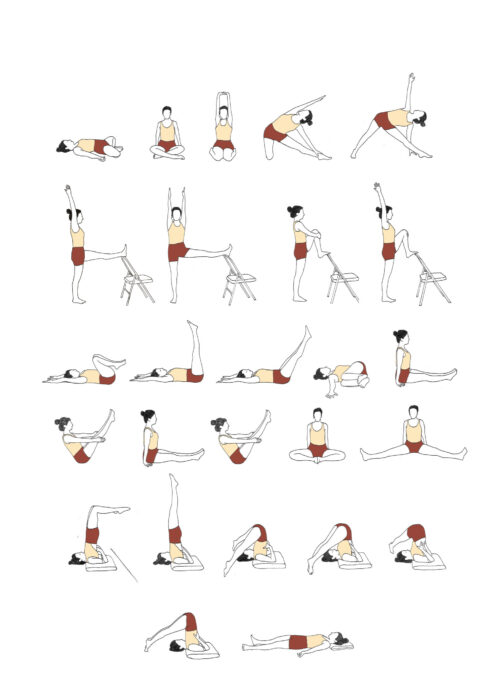
Numerous studies have shown that regular exercise can reduce depression symptoms. Yoga could have a different effect. Although it can be hard to exercise when you feel down, yoga can help you stay fit and eliminate negative emotions. Yoga classes can provide an immediate boost in motivation and a sense community that can help you stay focused. Yoga may be the next step in treating depression, according to promising research.
Research suggests that yoga has the ability to reduce depression symptoms. Research has shown that mind-body practices can dramatically improve psychological health. The American Yoga Association reports that there has been an increase in yoga practice in the US in the last decade. Several studies have shown that even a few minutes of daily practice can alleviate symptoms of depression and help patients feel better. Moreover, antidepressants can only improve your mood if they work on a small subset of your brain, so it is not a good idea to take them in large quantities.

There are options for treatment of depression other than medications. Cannabis oil can also be used to improve your mood. This substance is known to combat anxiety and increase energy. You can easily find CBD online. You can take cannabis oil supplements to improve your mood and reduce anxiety. CBD can prove to be extremely helpful when taken in combination with regular yoga. When taken regularly, it can significantly reduce the symptoms of depression.
Although there isn't any scientific evidence that yoga can cure depression it has been shown to decrease the symptoms. Studies have shown that yoga may be an effective complement to traditional treatments for depression. As a natural treatment for stress and anxiety, yoga may help manage depressive symptoms. For many people, it is one of the most effective ways to combat the disease. It is worth looking into it if you are in search of an alternative to medication.
Yoga can reduce symptoms and improve overall health. Psychotherapy and medications are the most common treatments for depression. However, not all people will benefit from them. Up to one-third of patients don't respond well to antidepressants, and they have negative side effects. These side effects can often be reversed by increasing your yoga practice. Yoga is widely recognized and valued for its many benefits. It is a great treatment for chronic depression.

Yoga may reduce symptoms and emotional eating. This can help with depression. Research has shown that yoga can have positive effects on your health and well-being. Many styles of yoga include meditation as a fundamental part. Studies have shown that meditation has positive effects on the brain, and the body. Yoga can improve mood and reduce depression risk. This can be an added benefit of regular practice.
FAQ
Is Cardio Exercise Good Or Bad For Your Health?
Cardiovascular exercise offers many benefits. It improves blood flow, strengthens your heart muscle and increases stamina.
Cardiovascular exercise includes running, biking, hiking, swimming, tennis, basketball, soccer, volleyball, football, etc.
It is important that cardio exercises are not performed at high intensities. This could lead to injury.
Only do the cardio exercise when you are feeling good.
You should never push yourself beyond your limits. You could injure yourself if you do.
It is important to warm up before you begin any cardiovascular exercise. Then, gradually build up to higher intensity levels.
You must always listen to what your body is telling you. If you feel pain when doing cardiovascular exercise, you should immediately stop.
After a cardiovascular training session, it is recommended that you take some time to relax. This allows your muscles time to recover.
Cardiovascular exercise can help you lose weight.
It is the most efficient way to lose weight and stomach fat.
What is the best 7-day workout program?
A seven-day exercise program should consist of three days per week of cardiovascular training (running, biking, swimming), two strength exercises (using free weights, weight machines), and one flexibility/core workout (yoga, Pilates). Each activity should be done at least once per week. The total time for each session should not exceed 45 minutes.
Cardiovascular Exercise: Running, Biking, Swimming
You should aim to get at least 60 mins of cardio exercise per week. You can aim for 75 minutes a week for best results. Cardio exercise can improve blood flow and stimulate muscle development.
Strength Training
Cardio exercises focus on the heart and lungs while strength training targets muscles and bones. Strength training builds lean muscle mass, which helps burn calories even when resting.
Flexibility & Core Workouts
Core and flexibility exercises are great ways of strengthening your whole body. Both yoga as well as Pilates are great choices.
Is Cardio Better Than Strength Training?
Both are equally effective. If you want to increase muscle mass faster, cardio is the better option.
Cardio burns more calories per minute than strength training and burns more fat.
Strength training is a great way to build muscle mass. However, it takes more effort than cardio.
Statistics
- Candidates and applicants must pass all four tests at 70% (minimum level) to graduate from Basic Deputy U.S. Marshal (BDUSM) Training. (usmarshals.gov)
- Get free shipping and 25% off today. (healthline.com)
- By John Thompson Take a whopping 38% off a set of PowerBlock Pros. (menshealth.com)
- Cardmembers earn 5% Back at Amazon.com with a Prime Credit Card. (amazon.com)
- According to the American Heart Association, blood pressure should be checked at least once every two years, beginning at age 20. (my.clevelandclinic.org)
External Links
How To
How can I burn fat while exercising?
Exercise reduces calories by increasing metabolism, and oxygen consumption.
You'll lose weight safely if you exercise at moderate intensity.
These are the top tips for burning fat while you exercise.
-
Cardio exercises like walking, running (or jogging), swimming, cycling, running, and/or elliptical training are all good options.
-
Do 30 minutes of exercise three times a week.
-
Add strength training to your workouts if you are looking to lose more weight.
-
Avoid intense workouts. You can build muscle and not break down muscle tissue.
-
Drink plenty of water during exercise. Water flushes out toxins, and keeps your body properly hydrated.
-
Choose low-fat protein shakes after working out. Protein shakes help repair muscles and boosts energy.
-
You can eat smaller meals throughout the day so that you don't feel hungry in between meals.
-
Don't skip breakfast! Skipping breakfast can lead to fatigue and sluggishness.
-
Take care of yourself mentally. Stressful situations may slow down your metabolism.
-
Keep a positive attitude. Research shows that overweight people gain more weight if they believe they are overweight than those who believe they look good.
-
Get enough sleep. It is harder to lose fat if you don't get enough sleep.
-
Be active. Be sure to get up and move around every hour or two.
-
Maintain a healthy diet. Eating right keeps you feeling full and satisfied longer.
-
Find relaxation methods. An anxious mind won't allow your body release stress hormones, which can lead to the destruction of muscle tissue.
A balanced diet includes all essential nutrients needed for growth and development.
Consider eating six small meals daily instead of three big ones. This gives your body the time it needs to process what you've eat.
To maintain strong bones, you need to consume 500 mg of calcium each day. Calcium can be found as a dairy product such as milk, yogurt and fortified soy drinks, orange juices, cereals, breads, and cereals.
Calcium is found in leafy vegetables, beans and tofu, as well nuts, seeds and cheese.
Vitamin D is essential for calcium absorption. Vitamin D can be found in egg yolk, fatty fish, and other fortified foods.
Vitamin E is crucial for skin health. It's found in vegetable oils, wheat germ oil, peanuts, almonds, sunflower seeds, and corn.
Zinc is essential for healthy immunity and wound healing. Zinc is found in seafood, oysters legumes meats, whole grains, whole grains and meats.
Zinc deficiency could cause fatigue, nausea, vomiting, and depression.
Consuming too much sugar can cause insulin resistance. This causes an increase in blood glucose levels. Insulin resistance causes weight gain.
Insulin resistance occurs when the bloodstream is full of free radicals. Free radicals are molecules that have unpaired electrons, which can cause damage to cell membranes or other parts of your body.
Free radicals come mainly from food additives, pesticides, herbicides, preservatives, smoking, air pollution, radiation, chemicals in cosmetics, lotions, and household cleaning supplies.
Free radical damage can cause cancer, heart disease and diabetes, as well as arthritis, asthma, and other diseases.
Antioxidants are essential for preventing free radical damage. Antioxidants protect against oxidative damage.
Vitamin C (found on citrus fruits), Beta carotene, found in carrots and sweet potatoes, spinach and broccoli, cantaloupe (found in tomatoes, mangoes and peppers), and Vitamin E (found nuts, olive oil and avocados).
Selenium, copper and manganese are all antioxidant nutrients.
Selenium helps to protect cells against free radicals and oxidative stress. Selenium can be found in Brazil nuts and liver, kidneys, liver, kidneys, shrimp, cod, turkey and lamb as well as chicken.
Copper protects your eyes, brain, eyes and red blood cell. Copper can be found in shellfish and poultry as well as meat and organ meats.
Manganese plays an important role in bone structure. Manganese is found as a component of bone structure in brown rice (spinach, bananas), prunes, raisins and oatmeal.
Zinc is essential for normal growth, reproduction, wound healing, and average growth. Zn is found in lean cuts of meat, white fish, poultry, and eggs.